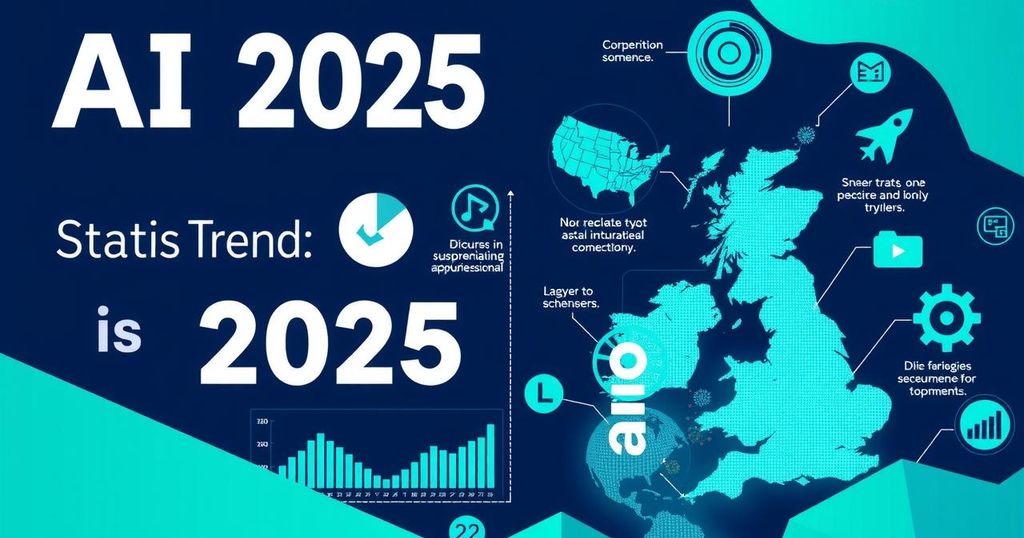UK Artificial Intelligence Statistics and Trends for 2025
The UK is currently witnessing a rapid rise in the adoption of artificial intelligence, with 79% of workers utilizing generative AI at their jobs. The AI market, valued over £16.6 billion, is projected to grow significantly. However, there are concerns over job displacement and ethical considerations in AI deployment.
Artificial intelligence (AI) is on an impressive upward trajectory in the UK, with projections for the future looking bright yet concerning. This burgeoning field promises to change various sectors—from self-driving vehicles to healthcare diagnostics and more. What does the landscape look like now and what can we expect in 2025? Here’s a look into the noteworthy statistics and trends shaping AI in Britain.
As of today, over three-quarters of Brits—79% to be precise—are using generative AI tools like ChatGPT at work. This is based on a recent poll by Forbes Advisor which surveyed 165 individuals and reveals just how integrated AI has become in daily job functions. It’s clear that AI is not just a trend; it’s a significant part of the fabric of modern professional life.
The UK’s AI market is impressive, currently valued over £16.6 billion. The US International Trade Administration predicts this figure might skyrocket to £788.41 billion by 2035. The last decade saw a staggering more than 600% increase in the number of AI companies established in the UK. When looking at organizations, about one in six have adopted at least one kind of AI technology, bunting the total number to around 432,000 across the nation.
Breaking it down further, large companies are leading the charge, with 68% having integrated AI into their operations. The figures drop to 33% for medium-sized firms and just 15% for small businesses. Interestingly, in a trial led by Marks & Spencer, using computer vision technology resulted in an impressive 80% reduction in warehouse accidents. Talk about AI making a difference!
When it comes to the types of AI technologies in use, British businesses show a focus on data management and analysis, as well as natural language processing. This echoes the broader trend observed where the IT and telecommunications sector tops the adoption rankings at almost 30%. However, hospitality and retail are lagging behind at around 11.5%—in a stark contrast to those leading sectors.
On the employment front, the AI sector is already employing more than 360,000 people, contributing significantly with £3.7 billion to the economy in 2022. In fact, the UK is home to double the number of AI companies compared to any other country in Europe. The forecast predicts health and social care will see the most job creation linked to AI over the next two decades.
Notably, job listings requiring AI skills are seeing salaries 20% higher than those that don’t. But there’s a flip side. Government estimates suggest around 7% of jobs could be displaced by AI in the next five years—this could jump to nearly 30% in two decades. That’s a pretty staggering statistic, potentially affecting over 2 million jobholders.
Awareness of AI language models, like ChatGPT, is notably high at 85%, but not everyone is on board. Eight of the 24 Russell Group universities have even banned their use. Looking ahead, self-driving vehicles are projected to hit UK streets by 2025, backed by a hefty £100 million investment from the government. However, a survey indicates a significant 85% of respondents have concerns about this technology.
Research & development is another chunk of the AI pie, with the UK ranked third globally in AI readiness. Since 2014, the government has pumped over £2.3 billion into AI initiatives. And they’re not stopping there—just this spring, commitments were made for nearly £1 billion towards furthering AI research. A cutting-edge supercomputer, dubbed ‘BritGPT’, is also in the cards, ensuring the UK stays ahead in AI development.
Trends reveal that despite AI’s advantages, many Brits are wary—about 59% express concerns ranging from job displacement to privacy issues. These worries reflect a nail-biting balance between harnessing AI’s potential and managing its societal implications. The public’s anxiety appears focused on several specific issues, with dependence on AI and privacy being top of mind for many
The AI landscape in the UK is advancing rapidly, with significant market growth, increased adoption by businesses, and a growing workforce dedicated to AI technologies. However, there are real concerns that accompany this progress, particularly about job displacement and the ethical use of AI. The future, particularly 2025, could hold transformative changes driven by AI while also presenting new challenges that need to be addressed thoughtfully. The balance between embracing this technology and managing its impacts will be crucial.
Original Source: www.forbes.com




